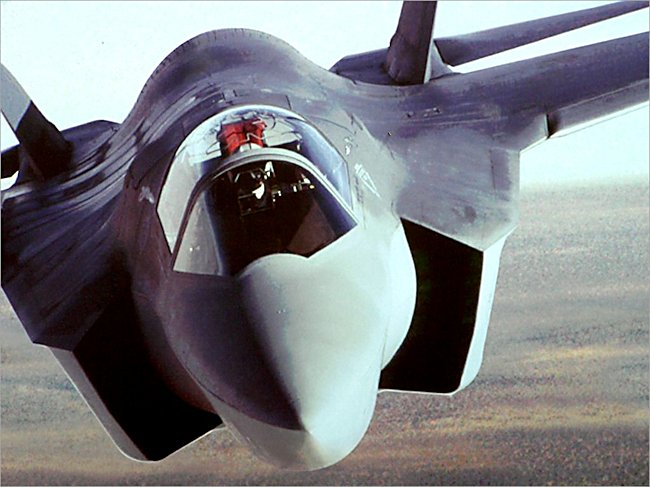RAF F-35 Lightning II
The F-35 Lockheed-Martin radar-evading stealth Joint Strike Fighter JSF is going to be the military aircraft of the future. In British service it will be called the Lightning II. It is designed to replace a number of current aircraft including AV-8B Harriers, F-16 Falcon, A-10 Thunderbolt II F/A-18 Hornets, British Sea Harriers and GR.7 Tornado fighters. The US Air Force's F-35A version will be a conventional takeoff and landing airplane costing about $37 million. The British Royal Navy, Royal Air Force and US The Marine Corps F-35B version ($46 million) will be a STOVL short takeoff and vertical landing aircraft. The F-35C Joint Strike Fighter ($48 million) is the US Navy's carrier-based strike fighter version. The first operational F-35 JSF is due to be delivered in 2008
It has a central lift-fan STOVL design powered by the aircraft engine via a clutched driveshaft. Northrop Grumman Corp in California are building the center section of the F35 JSF. BAE systems are building the rear section of the JSF in England and Lockheed Martin Corp are building the rest in Fort Worth. America and Britain are the main partners in this planes development but Holland, Italy, Turkey, Canada, Denmark , Australia, Belgium and Norway are also contributing development money and have agreed to buy the plane. It is expected that it's service life will last until 2040

The Future Aircraft Carrier (CVF) design will be greatly determined by the selection of aircraft to fly from the vessel. That process is now well underway; in 1996, the UK began the formal procurement process to examine options for a Future Joint Combat Aircraft (FJCA). This project is required to provide the fleet with a fighter/ attack aircraft to succeed the Sea Harrier that had been in service flying from the INVINCIBLE class carriers.
The aircraft to form the strike force of the Navy's new aircraft carriers is the Joint Strike Fighter (JSF) and Britain has signed a £1.3 billion deal with America to procure this aircraft. The Ministry of Defence (MOD) will replace the Navy's Sea Harrier FA2 and the RAF's Harrier GR7 with 150 of the new single-seat supersonic aircraft which will then take their place on the flight decks of the Navy's new aircraft carriers that are due in service by 2012. Though Defence Secretary Geoff Hoon said: "The Joint Strike Fighter will not simply replace the Harrier. It will give the UK an aircraft that can take off from an aircraft carrier and provide the agility of a light fighter with the punch of a bomber. Put simply, it will be the best aircraft of its type in the world."
On 26 October 2001 Lockheed Martin was selected for the contract to build the US-UK JSF. The deal signed with America ensures that British companies will be closely involved in the building of the aircraft. Production of the United Kingdom JSF is planned to start in 2008 with the first due to enter UK operational service in 2018, a date that will coincide with the arrival of the first of the Navy's new aircraft carriers. The MOD considered all other options very carefully before selecting the JSF as the preferred aircraft for its new aircraft carriers. The other options included a marinised version of the Eurofighter (232 Eurofighters are ordered for the RAF) the American F18E, the French Rafale and an updated Harrier. But the Short Take Off and Vertical Landing (STOVL) variant JSF emerged as the best option
F-35 Lightning II books


Tweet